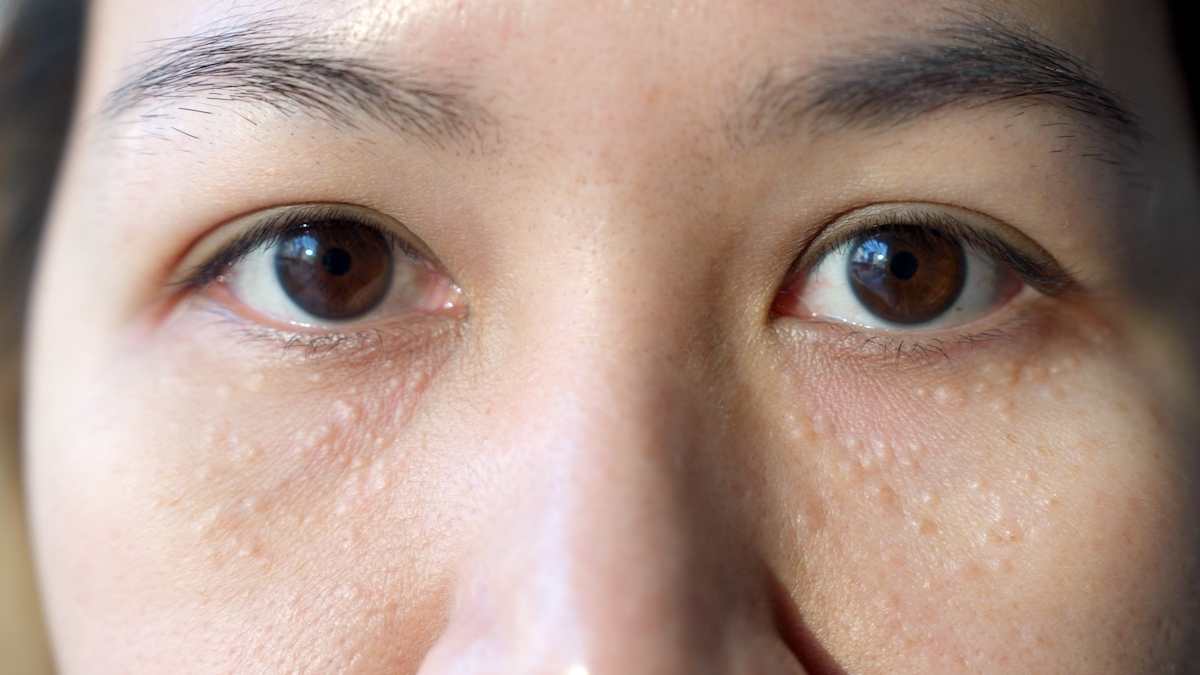Health
What Causes Milia (AKA Milk Spots) — And How Can You Safely Treat Them at Home?

Let’s talk milia (also known as milk spots). If you’re not familiar, these are the tiny white bumps that can appear around the eyes and on other parts of the face in babies, and virtually anywhere on older adults. A type of cyst caused by the accumulation of keratin beneath the surface of the skin, milia are often mistaken for pimples or clogged pores. Treating milia, however, requires a different approach than the one used to treat acne. Below are the causes of milia and tips for safe milia treatment at home.
What should I know about milia?
Milia or “milk spots” are caused by the buildup of dead skin cells, oil, and debris that get trapped in your pores. Unlike acne, milia are not inflammation-based. This means they’re not caused by bacteria or other irritants. They’re simply keratin-filled cysts that form under the skin’s surface. Unlike some other skin conditions, these little bumps typically don’t itch, ooze, smell bad, or feel painful.
How common are milia?
Milia are quite common, especially in newborns, those with fair skin, and those who are frequently exposed to the sun. For the former, milia tends to go away on its own within a few weeks. For adults, milia tend to be more persistent, though they typically respond well to treatments.
What causes milia to flare up?
Milia can appear due to many reasons, including:
Genetics
Genetics can play a role in whether or not you’re prone to developing milia. Research has found that people with a family history of milia are more likely to experience it themselves.
Skincare Products
The skincare products you use could also cause milia to appear. Products that are too heavy or thick, such as rich creams and oils, can trap dead skin cells and oil underneath the surface of your skin. This can lead to the formation of milia.
Sun Damage
UV radiation from the sun can damage the skin, causing the development of milia. Sun damage can thicken the skin, making it harder for dead skin cells to shed naturally.
Hormonal Changes
Hormonal changes can also play a role in the formation of milia. This is particularly true for women who experience increased androgens, which can cause the skin to produce more oil.
Poor Exfoliation
Exfoliation helps remove dead skin cells and prevent build-up. Exfoliate regularly as part of your skincare routine to avoid accumulation of the dead skin cells on the surface of your skin that prompt milia.
Medical Conditions and Treatments
In some cases, milia can be a symptom of an underlying medical condition or a medication side effect. For instance, if you have a skin disorder, such as rosacea or eczema, or if you’re undergoing chemotherapy or surgery, you may experience milia.
Trauma and Injury
Finally, milia can appear as a result of trauma or injury to the skin, such as burns, blisters, or acne. When the skin is injured, it may produce excess keratin, a protein that forms the outermost layer of the skin and hair, which can clog the pores and cause milia.
What’s the best way to treat milia?
Below are nine tips for treating a milia skin condition at home.
1. Don’t pick or scratch milia.
The first and perhaps most important tip for treating milia is to resist the urge to pick or scratch them. Doing so can cause scarring and infection or make them worse. Instead, stick to gentle treatments that encourage the skin to exfoliate naturally.
2. Use facial exfoliants.
Facial exfoliants are an excellent way to remove the build-up of dead skin cells, oil, debris, and trapped dirt that can cause milia to form. You may choose to invest in a gentle scrub or chemical exfoliant that can dissolve dead skin and promote cell turnover.
3. Avoid heavy skincare products.
Steer clear of harsh chemical-laden moisturizers and makeup formulated with ingredients known to cause acne. Instead, opt for organic skincare products like jojoba oil, argan oil, or rosehip seed oil, which are light and airy.
4. Use retinoids.
Retinoids come from vitamin A and can help with a variety of skin concerns — including milia, in some cases. It helps eliminate dead skin cells, promotes cell turnover to lessen milia formation, and keeps your skin smooth and even-toned. You can find topical retinoid creams, solutions, and serums at your local drugstore. However, they may not be ideal for individuals with highly sensitive skin types, as they can cause dryness and irritation.
5. Try topical creams.
Topical creams can help treat milia if they contain active ingredients like alpha hydroxy acids (AHAs). These ingredients work to soften the skin and reduce irritation, promoting healthy cell turnover and reducing the occurrence of milia.
6. Use a warm compress.
A warm compress may help soothe milia by softening the affected area. The warmth of the compress helps in the buildup of pus, thus helping the milia to “pop out.” To make your warm compress, dip a washcloth in warm water and let it sit on the affected area for three to four minutes.
7. Try a chemical peel.
Chemical peels are often effective when treating milia. They help loosen the dead skin cells and dirt, allowing the milia to come out. You can find over-the-counter chemical peels with ingredients like glycolic acid, lactic acid, and salicylic acid. Still, it’s smart to consult a dermatologist for advice when starting a new treatment.
8. Invest in a good sunscreen.
Protecting your skin from the sun is important to prevent milia and generally avoid damaging your skin in the long run. Choose a broad-spectrum sunscreen with high SPF content that offers UVA and UVB protection. Make sure to apply it every day, even when the weather is cloudy or cool.
9. Visit a dermatologist.
If your milia persists or worsens after trying the aforementioned remedies, it’s best to seek professional help. A board-certified dermatologist can recommend treatments such as laser therapy, cryotherapy, or steroid injections to help you get rid of milia. For smaller breakouts, they can also simply use a sterile needle or comedone extractor for easy milia removal.
Any advice on how to prevent milia?
Prevention is key when it comes to milia. Here are tips for keeping these tiny bumps at bay:
Cleanse your skin properly and often.
Proper cleansing is crucial to prevent milia. Make sure to remove all makeup and dirt from your face before going to bed. Use a gentle cleanser and massage it in with gentle circular motions, rinsing thoroughly with lukewarm water. Avoid using hot water, which can strip your skin of its natural oils and cause dryness.
Stay hydrated.
Drinking plenty of water is essential for preventing milia. When your skin is dehydrated, it can become dry, flaky, and prone to milia. Make sure to drink at least eight glasses of water per day to keep your skin hydrated and healthy. You can also incorporate hydrating foods into your diet, such as watermelon, cucumbers, and tomatoes.
Moisturize daily.
Using a light moisturizer every day is essential in milia prevention. Choose one that’s suited to your skin type and packed with hydrating ingredients like hyaluronic acid or glycerin. Apply it to your face morning, night, and whenever your skin feels dry.
When should I seek medical attention?
If you’ve tried self-care treatments at home and have seen no improvement after several months, it’s time to visit a dermatologist. Additionally, if you find that milia are spreading or new spots are appearing, seek medical help. Do the same if you have cysts or boils that are red, swollen, and painful. These may be signs of an infection, and they need to be treated by a professional.
Key Takeaways
Milia can be frustrating to deal with, but understanding why they appear can help you better prevent and treat them. Whether it’s limiting your sun exposure, using non-comedogenic products, or being aware of hormonal changes, there are steps you can take to keep your skin looking its best. Don’t be afraid, too, to get advice from a skincare professional. With the right care, you can achieve the healthy, clear skin of your dreams.

Health
‘We Walked Off 947 lbs!’: Hacks to Help You Double Fat Burn

Sign Up
Create a free account to access exclusive content, play games, solve puzzles, test your pop-culture knowledge and receive special offers.
Already have an account? Login
Use left and right arrow keys to navigate between menu items.
Use escape to exit the menu.
Health
Trump and a healthier America welcomed by doctors: 'New golden age'

With President Donald Trump back in the White House, many of America’s doctors are welcoming the new administration’s greater focus on health and wellness.
The Make America Healthy Again (MAHA) initiative — led by incoming Secretary of Health and Human Services Robert F. Kennedy Jr. — aims to improve nutrition, eliminate toxins, preserve natural habitats and fight the chronic disease epidemic, according to its website.
Several physicians shared with Fox News Digital what they hope and expect to see on the health front during the next four years.
BMI IS WRONG WAY TO MEASURE OBESITY, RESEARCHERS SAY — HERE’S WHAT THEY RECOMMEND INSTEAD
‘Return to community and family’
As Trump takes back the White House, Dr. Marc Siegel, Fox News senior medical analyst, said he looks forward to a greater focus on mental health.
President Donald Trump departs an indoor Presidential Inauguration parade event in Washington on Monday, Jan. 20, 2025. (AP Photo/Matt Rourke) (AP Newsroom)
“The mental health epidemic is worsening, including among our teens,” he told Fox News Digital — a problem that he said is worsened by “social media overreach.”
“The best approach is connectivity, and a return to a time of community and family priorities,” said Siegel, who is also a clinical professor of medicine at NYU Langone Health. “I am hopeful that President Trump will emphasize this.”
“The best approach is connectivity, and a return to a time of community and family priorities.”
The doctor is also optimistic that the new administration will focus on pandemic preparedness, based on lessons learned from COVID-19.
In particular, Siegel said he hopes to see increased surveillance, advances in biotechnology and the use of artificial intelligence to track threats.
Personalized medicine will also be a focus in Trump’s White House, Siegel predicted, with an increased use of wearables.

Personalized medicine will also be a focus in Trump’s White House, Siegel predicted, with an increased use of wearables. (CyberGuy.com)
“We could save hundreds of billions of dollars with DOGE (Department of Government Efficiency) and HHS addressing health care rather than sick care,” Siegel said.
“The focus will be on wellness, lifestyle, exercise and diet,” he added, along with a “war on ultraprocessed foods.”
‘Aspirational’ health and happiness
Dr. Ken Berry, a family physician and diabetes specialist in Tennessee, shared with Fox News Digital that he hopes Trump’s presidency will be a “new golden age for American health.”
“For too long, the practice of medicine has been polluted by corporate profits, questionable research, silenced physicians and misleading statements to the public,” said Berry, who helps patients overcome obesity, insulin resistance and type 2 diabetes.
SURGEON SHARES STORY OF INSURANCE PROVIDER CALLING DURING PATIENT’S SURGERY
“I hope to see a thoughtful re-evaluation of all existing research, the restoration of an unhindered doctor-patient relationship, the cessation of direct-to-consumer pharmaceutical advertising, and an end to Big Food’s misleading health claims,” Berry went on.
The doctor also encourages a “vigorous effort” to educate Americans on genuinely healthy food and lifestyle choices, along with a “renewed cultural appreciation for the idea that being healthy and happy is not only achievable, but also aspirational.”
Public health prioritized
Dr. Robert Lufkin, a California physician who is also a medical professor at UCLA and USC, applauded the new administration’s goal to address the rise in chronic diseases, including a focus on lifestyle factors and exposure to chemicals.
“I am excited about this administration’s possible health actions in several areas,” he shared with Fox News Digital.

One doctor said he hopes President Trump will emphasize connectivity among families and communities. (iStock)
In particular, Lufkin said the new administration aims to “prioritize research into environmental triggers such as pesticides, industrial pollutants and food additives.”
“They also plan to advocate for transparency in corporate practices and stricter regulation of industries contributing to environmental degradation,” he added.
NUTRITIONISTS REACT TO THE RED FOOD DYE BAN: ‘TOOK FAR TOO LONG’
Lufkin also highlighted MAHA’s goal to improve food safety and nutrition and to reduce exposure to unhealthy substances.
“This could be done by regulating harmful ingredients like artificial sweeteners, high-fructose corn syrup and chemical additives in processed foods,” he said.
Lufkin also supports the administration’s goal to restrict unhealthy foods for public assistance programs and to encourage local and sustainable farming.

Shifting the health care system’s focus from treatment to prevention is an important part of MAHA’s agenda, one doctor noted. (iStock)
Shifting the health care system’s focus from treatment to prevention is another important part of MAHA’s agenda, the doctor noted.
This could involve expanding alternative and holistic therapies and educating the public on the importance of lifestyle changes, including exercise, proper nutrition and stress management, he noted.
“Another goal is to minimize reliance on pharmaceuticals and encourage the use of natural treatments and non-drug interventions for common conditions,” Lufkin said.
The doctor also applauded the new administration’s plans to combat corporate influence in health care, and to “examine the pharmaceutical and chemical industries’ values of prioritizing profits over public health.”
Transparency in health care costs
Dr. Shana Johnson, a physical medicine and rehabilitation physician in Scottsdale, Arizona, said she hopes the Trump administration continues to build on its policy of increasing price transparency for clinics, hospitals, health insurers and pharmaceutical companies.
“Hidden prices, manipulated many times over, have allowed Americans to be overcharged and exploited for profit, whether it’s generic medications being marked up by 1,000% or an emergency room visit for dehydration costing $5,000,” she told Fox News Digital.
CHILDREN EXPOSED TO HIGHER FLUORIDE LEVELS FOUND TO HAVE LOWER IQS, STUDY REVEALS
In many cases, she noted, prices are “essentially hidden and manipulated,” which means the consumer has no idea of the cost basis or true value of a service.
“I am seeing more price manipulation to make it look like health insurance is paying for services, when they are actually upcharging the service,” she said.
“For example, if I pay the cash price for a mammogram, it is less expensive than if I use my health insurance,” Johnson went on. “This is true for generic drugs as well.”
Mental health resilience
The Trump administration has a “great opportunity” to address the growing mental health crisis in America, according to Jonathan Alpert, a psychotherapist in Manhattan and Washington, D.C.
“I truly believe the Trump administration has an opportunity and responsibility to address mental health in a way that helps people build resilience, not just catering to political or cultural trends,” he told Fox News Digital.

The Trump administration has a “great opportunity” to address the growing mental health crisis in America, a psychotherapist noted. (iStock)
One of Alpert’s big concerns, he shared, is that the “woke” culture may be inadvertently contributing to a mental health crisis.
“While it’s important to validate emotions and acknowledge systemic challenges, there’s a growing trend of overpathologizing normal human struggles and promoting victimhood as an identity,” Alpert said.
Rather than “overemphasizing individual traumas or identity-based grievances,” Alpert calls for a focus on accountability and personal growth.
“We need policies that foster self-reliance and mental toughness while still offering support for those who genuinely struggle.”
“We need policies that foster self-reliance and mental toughness while still offering support for those who genuinely struggle,” he said.
In Trump’s administration, Alpert said he hopes to see a commitment to mental health initiatives that foster both support and personal responsibility.

“Not every challenge is trauma, not every disagreement is harmful and not every failure stems from systemic oppression.” (iStock)
“This includes improving access to therapy, but also addressing how social media, divisive rhetoric and identity politics are affecting young people’s sense of self-worth and mental health,” he said.
“There’s a real danger in allowing cultural narratives to dictate how we approach mental health, turning it into a political battleground instead of a space for growth.”
“Not every challenge is trauma, not every disagreement is harmful and not every failure stems from systemic oppression,” Alpert went on.
Rather than encouraging victimhood, therapy should help people take ownership of their lives, develop resilience and thrive despite adversity, according to the psychotherapist.
Prosperity through health
As Donald Trump assumes the presidency, the U.S. looks to his administration with hopes for “substantial improvements in public health,” according to Dr. Brett Osborn, a Florida neurosurgeon and longevity expert.
“A key expectation is a commitment to reforming health care policy to make it more accessible and affordable,” he told Fox News Digital.

Doctors support MAHA’s goal to improve food safety and nutrition and to reduce exposure to unhealthy substances. (iStock)
“This could involve fostering competition in the health care market (thereby driving insurance premiums down), enhancing price transparency at the hospital level, and expanding coverage options to ensure that families across all income levels receive adequate care.”
CLICK HERE TO SIGN UP FOR OUR HEALTH NEWSLETTER
Osborn also hopes that the administration will tackle obesity by incentivizing healthier food options, more explicit nutritional labeling, and support for physical activity initiatives at schools.
“Furthermore, addressing food supplies in underserved areas could promote better access to fresh, nutrient-rich foods, reducing diet-related illnesses such as diabetes and heart disease,” he added.
“Without health on an individual and national scale, the nation will continue to falter.”
Another expectation is an emphasis on preventive instead of reactive care, according to Osborn.
“Encouraging regular health screenings to identify risk factors for disease and supporting wellness education campaigns could significantly reduce the burden of preventable diseases,” he said.
For more Health articles, visit www.foxnews.com/health
Ultimately, Osborn went on, the new administration has the potential to prioritize health — “not just as a matter of policy, but as a cornerstone of national prosperity.”
“Without health on an individual and national scale, the nation will continue to falter,” the doctor said.
“However, as President Trump said during his inauguration speech, ‘From this moment on, America’s decline is over.’”
Health
Celebrity Weight Loss Transformations: See Their Before and After Photos!

Sign Up
Create a free account to access exclusive content, play games, solve puzzles, test your pop-culture knowledge and receive special offers.
Already have an account? Login
Use left and right arrow keys to navigate between menu items.
Use escape to exit the menu.
-
/cdn.vox-cdn.com/uploads/chorus_asset/file/25826211/lorealcellbioprint.jpg)
/cdn.vox-cdn.com/uploads/chorus_asset/file/25826211/lorealcellbioprint.jpg) Technology1 week ago
Technology1 week agoL’Oréal’s new skincare gadget told me I should try retinol
-
/cdn.vox-cdn.com/uploads/chorus_asset/file/25832751/2192581677.jpg)
/cdn.vox-cdn.com/uploads/chorus_asset/file/25832751/2192581677.jpg) Technology6 days ago
Technology6 days agoSuper Bowl LIX will stream for free on Tubi
-

 Business1 week ago
Business1 week agoWhy TikTok Users Are Downloading ‘Red Note,’ the Chinese App
-
/cdn.vox-cdn.com/uploads/chorus_asset/file/25835602/Switch_DonkeyKongCountryReturnsHD_scrn_19.png)
/cdn.vox-cdn.com/uploads/chorus_asset/file/25835602/Switch_DonkeyKongCountryReturnsHD_scrn_19.png) Technology4 days ago
Technology4 days agoNintendo omits original Donkey Kong Country Returns team from the remaster’s credits
-

 Culture4 days ago
Culture4 days agoAmerican men can’t win Olympic cross-country skiing medals — or can they?
-
/cdn.vox-cdn.com/uploads/chorus_asset/file/24774110/STK156_Instagram_threads_1.jpg)
/cdn.vox-cdn.com/uploads/chorus_asset/file/24774110/STK156_Instagram_threads_1.jpg) Technology1 week ago
Technology1 week agoMeta is already working on Community Notes for Threads
-

 Politics5 days ago
Politics5 days agoU.S. Reveals Once-Secret Support for Ukraine’s Drone Industry
-

 Culture1 day ago
Culture1 day agoBook Review: ‘Somewhere Toward Freedom,’ by Bennett Parten














